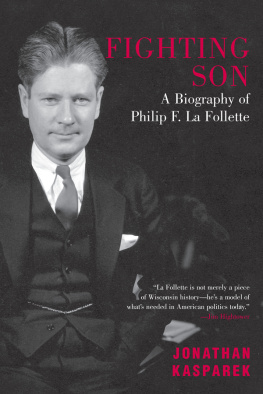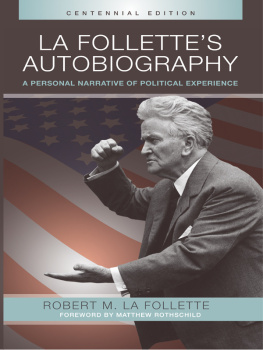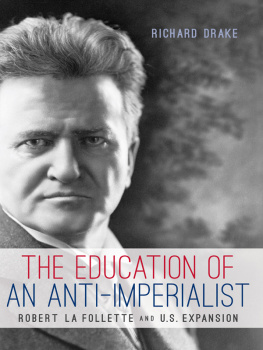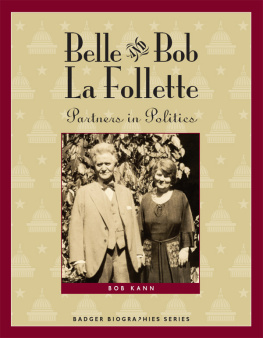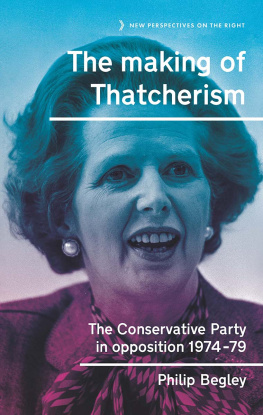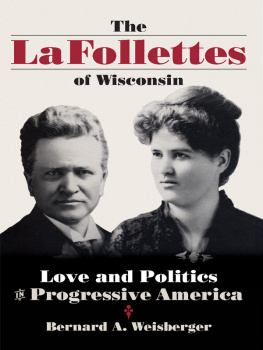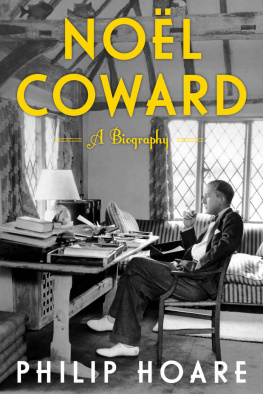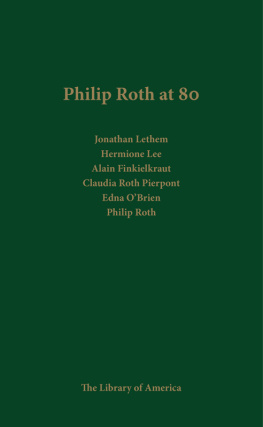This book began as a dissertation at the University of WisconsinMadison. My advisor, Professor John Milton Cooper Jr., supported this project from the beginning, encouraging my interest in the La Follette family and Wisconsin politics and pointing me in the right direction at critical points. He and the other members of my committee, Stanley Schultz, James Leary, Paul Boyer, Diane Lindstrom, and John Coleman, oversaw the process from inception to completion. Their guidance made the end result a vastly better product, although the responsibility for errors or omissions lies solely with the author.
Fred Risser, Bronson La Follette, Gaylord Nelson, and Frank Zeidler generously shared their recollections of the political events of the 1940s. I am particularly grateful to Judith Sorem and Robert La Follette III for discussing their father as a politician and as a parent. Their memories added depth to a person I knew only through decades-old correspondence. The staffs of the Wisconsin Historical Society and the Library of Congress unfailingly assisted with the vast accumulation of La Follette papers, always cheerfully deposited at my table and always meticulously organized. Grants from the WHS Amy Louise Hunter fellowship fund and from La Follette Godfrey & Kahn, Attourneys at Law,made this book possible. My friends and colleagues both in and outside of the University of Wisconsin department of history frequently offered suggestions and criticism that were always helpful, if not always welcome. Ronald Mershart listened patiently to my complaints throughout the process and urged me to soldier on, and Jack Holzhueter provided moral support as well as insight on Wisconsin history. To the Teaching Assistants Association (AFT local 3220) I owe a special debt: without its organizers and volunteers, the tuition waiver and TA salary I relied on for most of my time in graduate school would not have been.
Shepherding the manuscript from dissertation to published form turned out to be a much greater task than I imagined, and I owe thanks to many at the Wisconsin Historical Society for their efforts. Kate Thompson read the work critically and guided the editorial effort with skill and patience, providing suggestions for revision that invariably improved the text. Sara Phillips provided insightful editorial advice and suggestions. John Nondorf conducted illustration research, exploring the depths of the WHSs Visual Materials Archive and unearthing many striking photographs. Joe Heiman created the election maps to illustrate brilliantly the fortunes of candidate La Follette. The Wisconsin Historical Society is fortunate to have such talented people on its staff.
My parents-in-law, Daniel and Jo Markwyn, read early drafts critically and provided many helpful comments. They even seemed to appreciate the crash course in Wisconsin history. My parents, James and Carol Kasparek, provided emotional and financial support throughout my apparently endless college and graduate school career. They perhaps at times regretted the frequent admonition to stay in school, but their own interest in history and example of hard work set me on this path long ago.
My wife, Abby Markwyn, has lived with Phil almost as long as I have. As our life evolved to include two academic careers, two children, and another dissertation, she unfailingly supported this project. At the most discouraging points in the preparation of this biography, she has been my inspiration. Our children, James and William, reminded me again and again that as important as it is to read letters and microfilm, it is just as important to read Goodnight Moon. That balance made the completion of this book possible.
Bibliography
MANUSCRIPT COLLECTIONS
Thomas Amlie Papers. Archives Division. Wisconsin Historical Society.
John J. Blaine Papers. Archives Division. Wisconsin Historical Society.
John R. Commons Papers. Archives Division. Wisconsin Historical Society.
La Follette Family Papers. Manuscripts Division. Library of Congress.
Philip F. La Follette Papers. Archives Division. Wisconsin Historical Society.
Albert Schmedeman Papers. Archives Division. Wisconsin Historical Society.
INTERVIEWS AND CORRESPONDENCE WITH THE AUTHOR
La Follette, Bronson. Telephone conversation. January 2, 2003.
Nelson, Gaylord. Telephone conversation. February 25, 2003.
Risser, Fred A. Interview. November 13, 2002.
Sorem, Judith, and Robert La Follette III. Letter to the author. October 9, 2005.
Zeidler, Frank P. Letter to the author. March 11, 2003.
PRIMARY ARTICLES
Adamic, Louis. La Follette Progressives Face the Future. The Nation 140 (February 20, 1935): 21315.
. A Talk with Phil La Follette. The Nation 140 (February 27, 1935): 24245.
After La FolletteWhat? Literary Digest 86 (July 4, 1925): 911.
Another La Follette in the Senate? Literary Digest 86 (September 26, 1925): 1011.
Barry, Richard. A Radical in Power: A Study of La Follette. Outlook 132 (November 29, 1922): 56667.
Bliven, Bruce. Robert M. La Follettes Place in Our History. Current History 22 (August 1925): 716.
Blythe, Samuel G. Let X=La Follette. Saturday Evening Post 197 (October 18, 1924): 14+.
Cobb, Irvin S. The Thunders of Silence. Saturday Evening Post 190 (February 9, 1918): 35 and 3842.
Conway, W. J. Taxation in Wisconsin. Wisconsin Blue Book (1927): 11538.
Dark Days Ahead: A Dialogue on the Bankruptcy of Business Leadership. Forum 84 (October 1930): 200207.
Davenport, Walter. Fighting Blood. Colliers 89 (April 23, 1932): 1011+.
. An Uncertain Party. Colliers 97 (May 23, 1936): 1415+.
Dell, Robert. Phil La Follette Is Right. The Nation 148 (April 29, 1939): 48788.
Devens, Stanley Price. Wisconsin after La Follette. Christian Century (June 21, 1939): 793.
Fried, Orrin A. Wisconsin Manufacturing Since 1929. Wisconsin Blue Book (1933): 14142.
Frost, Stanley. The Scramble for Fighting Bobs Shoes. Outlook 140 (July 29, 1925): 46062.
Gale, Zona. Americans We Like. The Nation 126 (February 15, 1928): 18082.
Garrett, Garet. Section Seven-A at Sheboygan. Saturday Evening Post (October 27, 1934): 57+.
A Great Message. The Nation 133 (December 9, 1931): 403.
Groves, Harold. The Wisconsin State Income Tax. Wisconsin Blue Book (1933): 5167.
Hallgren, Mauritz A. Governor La Follette. The Nation 82 (April 29, 1931): 47375.
Hard, William. That Man La Follette. The Nation 119 (July 16, 1924): 65.
In La Follette-Land. Time (October 22, 1928): 1112.
Kent, Frank R. Little Bob Wins. The Nation 121 (December 30, 1925): 758.
La Follette as a Boss Ventriloquist. Current Opinion 77 (August 1924): 14344.
La Follette, Dictator. The Nation 118 (April 2, 1924): 360.
La Follette, Philip F. Review of John Gunther, The Riddle of MacArthur. Freeman, May 7, 1951, n.p.
La Follette Nadir. Newsweek (August 26, 1946): 1617.
La Follette Thunder. The Nation 146 (April 30, 1938): 49293.
La Follettes Defeat. Life (August 26, 1946): 2627.

